Filter by
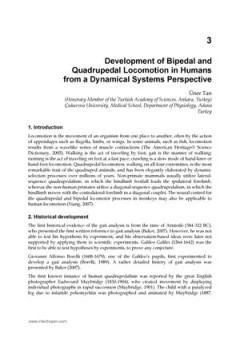
Development of Bipedal and Quadrupedal Locomotion in Humans from a Dynamical …
Development of Bipedal and Quadrupedal Locomotion in Humans from a Dynamical Systems Perspective
- Edition
- -
- ISBN/ISSN
- 9789535106104
- Collation
- -
- Series Title
- -
- Call Number
- -
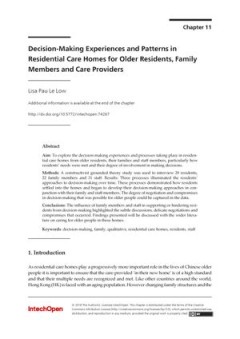
Decision-Making Experiences and Patterns in Residential Care Homes for Older …
Aim: To explore the decision-making experiences and processes taking place in residential care homes from older residents, their families and staff members, particularly how residents’ needs were met and their degree of involvement in making decisions.
- Edition
- -
- ISBN/ISSN
- 9781789232523
- Collation
- -
- Series Title
- -
- Call Number
- -
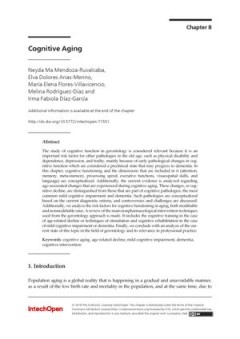
Cognitive Aging
The study of cognitive function in gerontology is considered relevant because it is an important risk factor for other pathologies in the old age, such as physical disability and dependence, depression, and frailty, mainly because of early pathological changes in cognitive function which are considered a preclinical state that may progress to dementia. In this chapter, cognitive functioning and…
- Edition
- -
- ISBN/ISSN
- 9781789232523
- Collation
- -
- Series Title
- -
- Call Number
- -
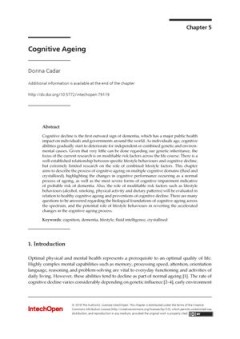
Cognitive Ageing
Cognitive decline is the first outward sign of dementia, which has a major public health impact on individuals and governments around the world. As individuals age, cognitive abilities gradually start to deteriorate for independent or combined genetic and environmental causes. Given that very little can be done regarding our genetic inheritance, the focus of the current research is on modifiabl…
- Edition
- -
- ISBN/ISSN
- 9781789237603
- Collation
- -
- Series Title
- -
- Call Number
- -
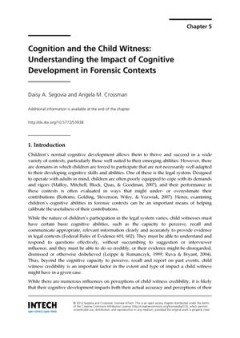
Cognition and The Child Witness Understanding The Impact of Cognitive Develo…
Cognition and the Child Witness: Understanding the Impact of Cognitive Development in Forensic Contexts
- Edition
- -
- ISBN/ISSN
- 9789535108559
- Collation
- -
- Series Title
- -
- Call Number
- -
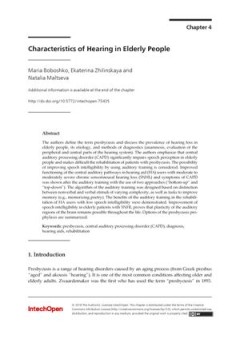
Characteristics of Hearing in Elderly People
The authors define the term presbycusis and discuss the prevalence of hearing loss in elderly people, its etiology, and methods of diagnostics (anamnesis, evaluation of the peripheral and central parts of the hearing system). The authors emphasize that central auditory processing disorder (CAPD) significantly impairs speech perception in elderly people and makes difficult the rehabilitation of …
- Edition
- -
- ISBN/ISSN
- 9781789232523
- Collation
- -
- Series Title
- -
- Call Number
- -
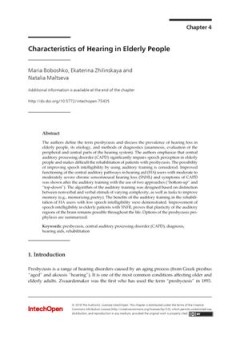
Characteristics of Hearing in Elderly People
The authors define the term presbycusis and discuss the prevalence of hearing loss in elderly people, its etiology, and methods of diagnostics (anamnesis, evaluation of the peripheral and central parts of the hearing system). The authors emphasize that central auditory processing disorder (CAPD) significantly impairs speech perception in elderly people and makes difficult the rehabilitation of …
- Edition
- -
- ISBN/ISSN
- 9781789232523
- Collation
- -
- Series Title
- -
- Call Number
- -
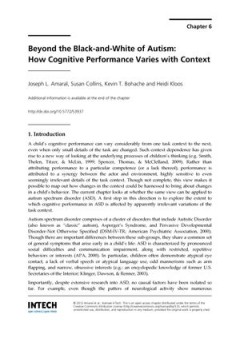
Beyond The Black-and-White of Autism How Cognitive Performance Varies With C…
Beyond the Black-and-White of Autism: How Cognitive Performance Varies with Context
- Edition
- -
- ISBN/ISSN
- 9789535108559
- Collation
- -
- Series Title
- -
- Call Number
- -
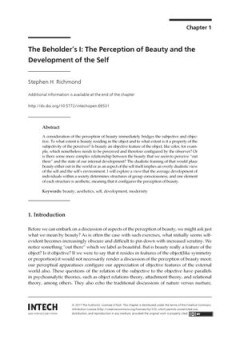
The Beholder’S I The Perception of Beauty and The Development of The Self
A consideration of the perception of beauty immediately bridges the subjective and objective. To what extent is beauty residing in the object and to what extent is it a property of the subjectivity of the perceiver? Is beauty an objective feature of the object, like color, for example, which nonetheless needs to be perceived and therefore configured by the observer? Or is there some more comple…
- Edition
- -
- ISBN/ISSN
- 9789535135814
- Collation
- -
- Series Title
- -
- Call Number
- -
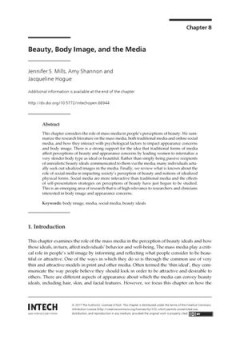
Beauty, Body Image, and the Media
This chapter analyses the role of the mass media in people’s perceptions of beauty. We summarize the research literature on the mass media, both traditional media and online social media, and how they appear to interact with psychological factors to impact appearance concerns and body image disturbances. There is a strong support for the idea that traditional forms of media (e.g. magazines an…
- Edition
- -
- ISBN/ISSN
- 9789535135814
- Collation
- -
- Series Title
- -
- Call Number
- -
 Computer Science, Information & General Works
Computer Science, Information & General Works  Philosophy & Psychology
Philosophy & Psychology  Religion
Religion  Social Sciences
Social Sciences  Language
Language  Pure Science
Pure Science  Applied Sciences
Applied Sciences  Art & Recreation
Art & Recreation  Literature
Literature  History & Geography
History & Geography